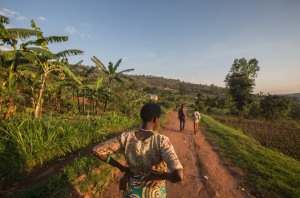Near Kinshasa’s biggest airport, I happened to catch sight of what might be its only train. It makes the blue metal boxes clanking through India look advanced. These could’ve been rusting shipping containers with windows cut in the sides. I have no idea how the “cars” were strung together, let alone with so many people on it. I have even greater difficulty imaging that it actually moved.
Which seems to be the theme of the cultural adventure that is Kinshasa. The only thing that makes this city work is will power. Sheer will power. I came here to tag-team some reporting with Another More Hotshot Journalist. He got his shoes polished (with kerosene) as I was buying cokes, and another guy tried to get business out of me. I was wearing my utterly grayed out hiking boots, which is to say shoes that are mostly variations on cloth. I said no several times, trying to indicate they were unpolishable, and he disappeared.
Then I look down and see he’s trying to polish the rubber sole. He wanted business, and I think it was more a refusal to acknowledge than an inability to understand that I had none to give, and eventually I paid him 250 francs to stop trying to polish my shoes. At which point, the guy who made 500 francs—a price so high the would-be-hiking-boot polisher had laughed at the More Hotshot Journalist for paying it—and he said, clutching his 500 franc bill, “And what about me, Madame? What about me?”
The whole city rides on that combination of beyond-Jacksonian work ethic and outside-market-economics logic. We met a guy at the hotel who took us to the central market in Gombe, and the More Hotshot Journalist asked him if things were better since Mobutu. “Some things,” he said. “Security. But we work hard for very little money.”
He’s not kidding. There’s commerce everywhere, but I can’t figure out where the profit is. It’s so minimal it’s almost curious people work at all.
In the biggest market in Gombe, Kinshasa’s busy business district, people sit all day long in the sun hoping passers-by will want notebooks or used clothes or sandals, and at the end of the day, when they don’t, the goods are piled back into the chariot , a big metal box with two fat tires in the center and metal handlebars in the front and back, like a double-sided wheelbarrow. They’re tarped and tied, and then drug through the streets back to someone’s home. Twelve hours later, they’ll be drug back to the market, where maybe the next day fewer of them will come home.
The More Hotshot Journalist told me that some sources for a banking story he did in Nairobi made picture books to explain banking and savings to Kenyans. With savings, the pictures explained, you can purchase a CD (the investment kind, not the music kind), a this, a that, and the money ever increases.
What stood out to him was a little scene where a single mother is learning that if she denies herself a new mattress or a nice dress or any of the other things she’d like to treat herself to, over the course of a year and a half, she can save $200.
We didn’t actually do the math then, but that’s $11 and 11 cents a month.
It can’t be much different in Kinshasa, except that maybe people can’t save quite as much. This city swells with willing (and in our experience, honest) labor, but the only thing that trickles down is the sweat of the people trying to save $11.11 a month.




yay! you’re back! and observing, searching, commentating and writing as incisively as ever. thank goodness.